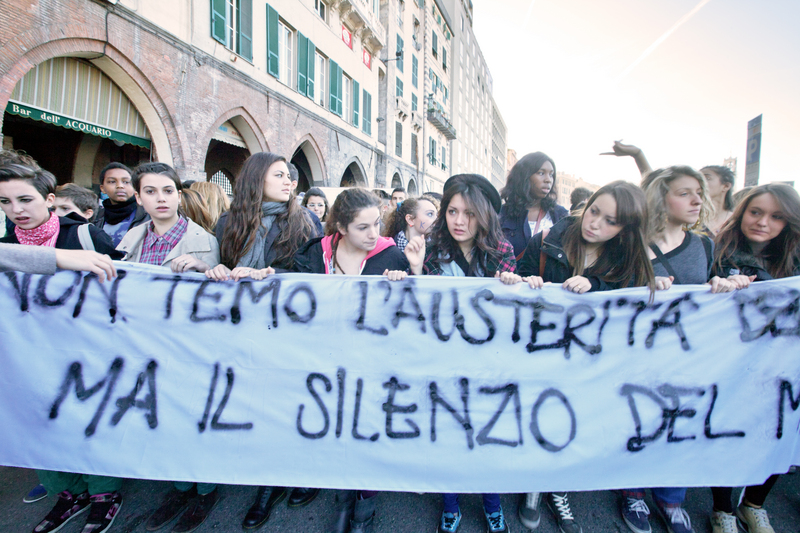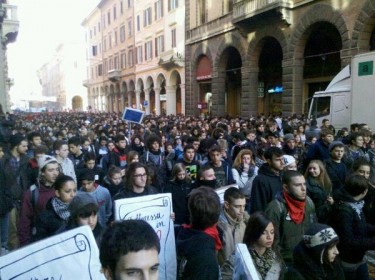This post is part of our special coverage Europe in Crisis.
November 14, 2012 witnessed the first strike of its kind, including all of the southern European countries most affected by austerity and financial crisis. Organized labor in Spain and Portugal announced general strikes, while in Greece and Italy there were work stoppages planned during the day.
(In the days prior, visits by top European officials and leaders including Angela Merkel were met with street protests across southern Europe.)
On Twitter, a number of hashtags were in use. Spain, Portugal and Greece used #14N, and Italy has #14Nit and Catalonia #14NBcn #14NCat. English speakers used #N14Riseup #europeanstrike #N14.
Events in solidarity also occurred across Europe – mapped by the European Trade Union Confederation. A “siege” of the European Commission by an estimated 2,500 people left Brussels tense in the afternoon.

Students of Genoa protest against austerity measures, on 14th November 2012. A banner reads “I don't fear austerity, I fear silence!”. Photo by Donna Bozzi, copyright Demotix
Greece
Greek unions, fresh out of recent general strikes of their own, did not officially respond to the call for a general strike, although a work stoppage was called for and middling sized protests were held in Athens and Thessaloniki, besides the sectoral and regional anti-austerity strikes and occupations, ongoing for a third year in a row.
Al Jazeera English reporter Barnaby Phillips mused:
@BarnabyPhillips: Atmosphere at #14N protest in Athens is somewhat weary, ritualistic. But turn-out is healthy. #14ngr #Greece
Several netizens livetweeted photos of the rallies. European solidarity against austerity was expressed through slogans, placards and huge flags paraded in downtown Athens:

Portuguese, Greek and Spanish flags in Athens, on November 14, 2012. Photo by @thesspirit, republished by permission
Elderly protesters were also in attendance, besides youth. Repeated pension cuts have brought many pensioners below the poverty line.

Anti-austerity protest in Athens on November 14, 2012. Pensioner carrying placard that reads “I fear hunger, my God”. Photo by @iptamenos33 on Twitpic, republished by permission
Italy
Tens of thousands of people took to the streets in Milan, Bologna, Turin, Padua, Genoa, Rome, Naples and around 100 other towns throughout the country [it]. While joining the anti-austerity European Day of Action [it] under such slogan as: “Europe is waking up today — from Rome to Madrid to Athens,” Italians were calling for more safeguards for jobs and pensions and complaining against stringent measures imposed by Prime Minister Mario Monti.
Citizens from all walks of life protested in a very peaceful and creative fashion, even if some clashes broke out. Overall at least six police officers were wounded, including one seriously in Turin, along with three people arrested in Brescia and at least a dozen in Rome. Gabriele Drudi [it] compiled an extensive timeline with many tweets and pictures covering the entire day of protests.
Riccardo Laterza writes:
(@riccardolaterza): #14N #14nIT il primo sciopero generale europeo: grande partecipazione, grande repressione. Uno schema già visto ma non ci arrendiamo!
@riccardolaterza: #14N #14nIT the first european general strike: great participation, great repression. A pattern already seen it but we will not give up!
Laura says:
@scarylalla: Nel bene e nel male, oggi gli europei stanno dimostrando che non è la moneta unica ad unirli ma la voglia di un Europa diversa. #14N #14Nit
@scarylalla: For better or for worse, today europeans are showing that it is not a single currency that can keep us together, but our desire for a different Europe. #14N #14Nit
Others provide an opposite viewpoint, including Salvatore Filippelli:
@salvo_82: Credete davvero che gli Eurocrati cambieranno le politiche economiche perchè qualche studente spacca due o tre vetrine? #14N #14nIT
@salvo_82: Do you really believe that the Eurocrats will change their economic policies because some students break two or three shop windows? #14N #14nIT
Analysis and discussion on the protest outcomes are still in progress on a Facebook group and on YouTube events are discussed at an afternoon general assembly at Rome's University.
Spain
In the early morning hours, a blockade of one of the entrances to Barcelona was swiftly taken down by police. Images of Madrid’s empty train and metro stations circulated as proof the general strike was in effect.
Protesters on wheels set up “bici piquetes” (bicycle pickets) in Madrid and Zaragoza, trending in the morning (#bicipiquetes) and shared widely on social media.
Global Voices’ Lali Sandiumenge, whose blog post on a strike against telecom Telefonica was recently deleted by newspaper La Vanguardia, reported from the streets on the strike. She tweeted what many people felt yesterday:
@lalisandi Aventatges d'informar-se per la xarxa: hi ha multitud de punts de vista. És interactiu. Té el do de la ubiqüitat. No té pressions
The “Iaioflautas” – Catalonia’s rebel retirees (see our profile) were very visible, performing on the street.
Large protests occurred throughout Spain from Galicia to Valencia, with police charging and arresting protesters, like in Barcelona.
Police violence dominated the afternoon. A photo of a woman allegedly pushed by police down the stairs of the Metro in Madrid was widely shared and commented, as were photos of rubber bullets shot by police at protesters.
But most viral was the image of a school-age (13yo) boy in Tarragona bloodied by police, and the video of police attacking him and women around him.
Lastly there were arguments over the size of the protests, with low government estimates subject to ridicule online
@gobiernoespa: La Delegación del Gobierno habla de 35.000 personas en Madrid. Definitivamente hay una puerta a otra dimensión allí.pic.twitter.com/M5smSf3F
Portugal
In the beginning things were more quiet in Portugal, with widespread adherence to the general strike. Tens of thousands took to the city’s main streets, including members of public broadcaster RTP who were on strike earlier this month (see our coverage).
An evening confrontation between police and protesters in front of Portuguese Government parliament in Lisbon transformed a peaceful protest into a scene of uncontrolled violence. Youtube user Beatriz Pedrosa filmed rock throwing by youth in black hoodies and wearing anarchist t-shirts:
Then came a barrage and charge from police which emptied the plaza in less than two minutes
Blog Activismo de Sofá reacted:
Enquanto os profissionais da pedrada se digladiam com profissionais da cacetada, o esforço feito por centenas de milhares de pessoas neste dia é posto em causa. Longe de desculpabilizar os primeiros (uns arruaceiros), acho de qualquer modo que se exige “um bocadinho” mais dos segundos (uns arruaceiros fardados).
This post is part of our special coverage Europe in Crisis.








5 comments